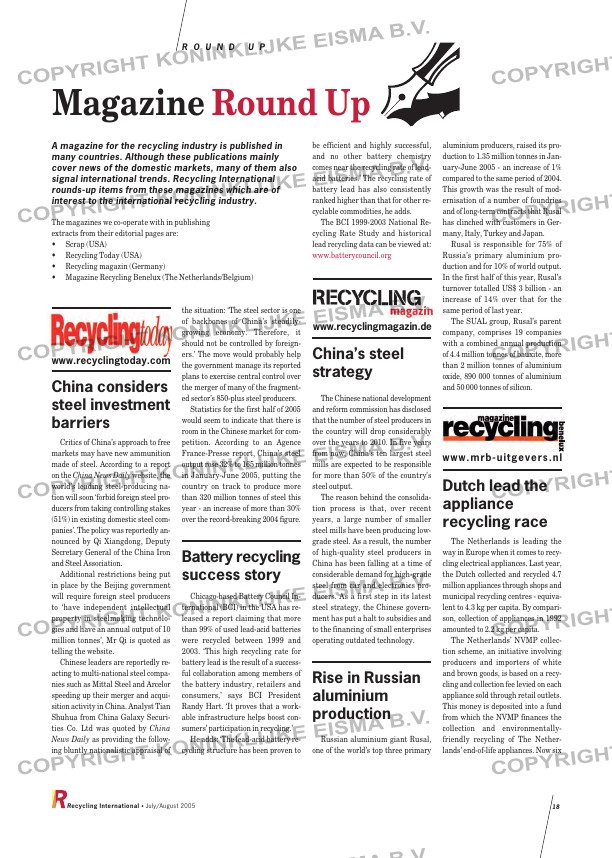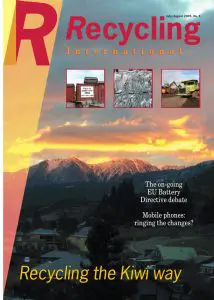Page 18 from: July / August 2005

China considers
steel investment
barriers
Critics of China’s approach to free
markets may have new ammunition
made of steel. According to a report
on the China News Daily website, the
world’s leading steel-producing na-
tion will soon ‘forbid foreign steel pro-
ducers from taking controlling stakes
(51%) in existing domestic steel com-
panies’. The policy was reportedly an-
nounced by Qi Xiangdong, Deputy
Secretary General of the China Iron
and Steel Association.
Additional restrictions being put
in place by the Beijing government
will require foreign steel producers
to ‘have independent intellectual
property in steelmaking technolo-
gies and have an annual output of 10
million tonnes’, Mr Qi is quoted as
telling the website.
Chinese leaders are reportedly re-
acting to multi-national steel compa-
nies such as Mittal Steel and Arcelor
speeding up their merger and acqui-
sition activity in China. Analyst Tian
Shuhua from China Galaxy Securi-
ties Co. Ltd was quoted by China
News Daily as providing the follow-
ing bluntly nationalistic appraisal of
the situation: ‘The steel sector is one
of backbones of China’s steadily-
growing economy. Therefore, it
should not be controlled by foreign-
ers.’ The move would probably help
the government manage its reported
plans to exercise central control over
the merger of many of the fragment-
ed sector’s 850-plus steel producers.
Statistics for the first half of 2005
would seem to indicate that there is
room in the Chinese market for com-
petition. According to an Agence
France-Presse report, China’s steel
output rose 32% to 165 million tonnes
in January-June 2005, putting the
country on track to produce more
than 320 million tonnes of steel this
year – an increase of more than 30%
over the record-breaking 2004 figure.
Battery recycling
success story
Chicago-based Battery Council In-
ternational (BCI) in the USA has re-
leased a report claiming that more
than 99% of used lead-acid batteries
were recycled between 1999 and
2003. ‘This high recycling rate for
battery lead is the result of a success-
ful collaboration among members of
the battery industry, retailers and
consumers,’ says BCI President
Randy Hart. ‘It proves that a work-
able infrastructure helps boost con-
sumers’ participation in recycling.’
He adds: ‘The lead-acid battery re-
cycling structure has been proven to
be efficient and highly successful,
and no other battery chemistry
comes near the recycling rate of lead-
acid batteries.’ The recycling rate of
battery lead has also consistently
ranked higher than that for other re-
cyclable commodities, he adds.
The BCI 1999-2003 National Re-
cycling Rate Study and historical
lead recycling data can be viewed at:
www.batterycouncil.org
China’s steel
strategy
The Chinese national development
and reform commission has disclosed
that the number of steel producers in
the country will drop considerably
over the years to 2010. In five years
from now, China’s ten largest steel
mills are expected to be responsible
for more than 50% of the country’s
steel output.
The reason behind the consolida-
tion process is that, over recent
years, a large number of smaller
steel mills have been producing low-
grade steel. As a result, the number
of high-quality steel producers in
China has been falling at a time of
considerable demand for high-grade
steel from car and electronics pro-
ducers. As a first step in its latest
steel strategy, the Chinese govern-
ment has put a halt to subsidies and
to the financing of small enterprises
operating outdated technology.
Rise in Russian
aluminium
production
Russian aluminium giant Rusal,
one of the world’s top three primary
aluminium producers, raised its pro-
duction to 1.35 million tonnes in Jan-
uary-June 2005 – an increase of 1%
compared to the same period of 2004.
This growth was the result of mod-
ernisation of a number of foundries
and of long-term contracts that Rusal
has clinched with customers in Ger-
many, Italy, Turkey and Japan.
Rusal is responsible for 75% of
Russia’s primary aluminium pro-
duction and for 10% of world output.
In the first half of this year, Rusal’s
turnover totalled US$ 3 billion – an
increase of 14% over that for the
same period of last year.
The SUAL group, Rusal’s parent
company, comprises 19 companies
with a combined annual production
of 4.4 million tonnes of bauxite, more
than 2 million tonnes of aluminium
oxide, 890 000 tonnes of aluminium
and 50 000 tonnes of silicon.
Dutch lead the
appliance
recycling race
The Netherlands is leading the
way in Europe when it comes to recy-
cling electrical appliances. Last year,
the Dutch collected and recycled 4.7
million appliances through shops and
municipal recycling centres – equiva-
lent to 4.3 kg per capita. By compari-
son, collection of appliances in 1992
amounted to 2.2 kg per capita.
The Netherlands’ NVMP collec-
tion scheme, an initiative involving
producers and importers of white
and brown goods, is based on a recy-
cling and collection fee levied on each
appliance sold through retail outlets.
This money is deposited into a fund
from which the NVMP finances the
collection and environmentally-
friendly recycling of The Nether-
lands’ end-of-life appliances. Now six
www.recyclingtoday.com
A magazine for the recycling industry is published in
many countries. Although these publications mainly
cover news of the domestic markets, many of them also
signal international trends. Recycling International
rounds-up items from these magazines which are of
interest to the international recycling industry.
The magazines we co-operate with in publishing
extracts from their editorial pages are:
• Scrap (USA)
• Recycling Today (USA)
• Recycling magazin (Germany)
• Magazine Recycling Benelux (The Netherlands/Belgium)
R O U N D U P
Magazine Round Up
www.mrb-uitgevers.nl
Recycling International • July/August 2005 18
www.recyclingmagazin.de



